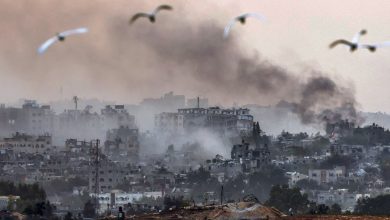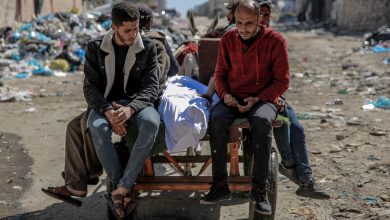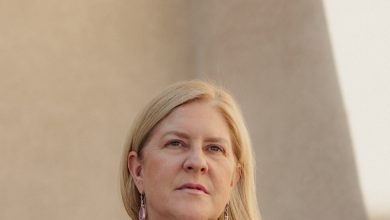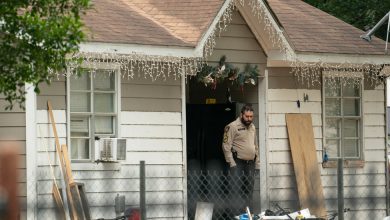West Ups Pressure on Putin, Including Sanctions on Reputed Girlfriend

KRAKOW, Poland — President Vladimir V. Putin of Russia faced fresh setbacks Friday over the Ukraine invasion, as Sweden became the second neutral country in two days to move toward joining NATO and the West devised ways to reroute Ukrainian grain past a Russian naval blockade.
New signs of a Russian military retreat near Ukraine’s second-largest city, Kharkiv, also added to Mr. Putin’s challenges, appearing to subvert or at least delay the Kremlin’s goal of encircling Ukrainian forces concentrated in eastern Ukraine.
But for Mr. Putin, the biggest vexation may have been the most personal: Britain slapped sanctions on his ex-wife, Lyudmila Ocheretnaya,on a former Olympic gymnast long rumored to be his girlfriend, Alina Kabaeva, and on three cousins: Igor, Mikhail and Roman Putin.
“We are exposing and targeting the shady network propping up Putin’s luxury lifestyle and tightening the vise on his inner circle,” Britain’s foreign secretary, Liz Truss, said.
The West faced challenges of its own. Even as Sweden signaled that it would benefit from joining NATO — one day after Finland said it was ready to join — the president of Turkey signaled his objections to an expansion of the alliance, a possible complication that could work in Russia’s favor. Foreign ministers of the alliance were meeting Saturday in Germany, and invited counterparts from Sweden and Finland to join them.
In a sign that not all diplomatic channels have been cut off, the American secretary of defense, Lloyd J. Austin III, spoke on Friday with Sergei K. Shoigu, Russia’s defense minister, for the first time since Feb. 18 — six days before the invasion of Ukraine.Mr. Austin pushed for an immediate cease-fire in Ukraine and emphasized the importance of maintaining lines of communication, according to John F. Kirby, the Pentagon spokesman.
The Russian Defense Ministry said the call had been held “at the initiative of the American side,” which two senior U.S. officials confirmed.
Top Pentagon officials, including Mr. Austin, had repeatedly tried to contact their Russian counterparts in the aftermath of the invasion. Until Friday, those efforts had been unsuccessful.
“What motivated them to change their mind and be open to it, I don’t think we know for sure,” one senior Pentagon official said, speaking on condition of anonymity to describe a confidential call. He said the hourlong conversation was “professional” but broke no new ground. Mr. Austin nevertheless hoped it would “serve as a springboard for future conversations,” the official said.
It was the highest-level contact between U.S. and Russian leaders since Jake Sullivan, President Biden’s national security adviser, spoke with Gen. Nikolay Patrushev, secretary of the Russian Security Council, on March 16, to reiterate the United States’ strong opposition to the invasion.
Russia has taken roughly 80 percent of the Donbas region of eastern Ukraine, where its latest offensive has been concentrated. If Moscow can hold that territory, it would gain significant leverage in any future talks. Yet it has been struggling to gain more ground against Ukrainian forces wielding heavy weapons supplied by the West.
On Friday, Russian forces bombarded largely abandoned and devastated towns in Donbas while Ukrainian forces drove Russian troops further away from Kharkiv in the northeast. The Ukrainian counteroffensive there was beginning to rival the one that pushed Russian troops away from Kyiv, Ukraine’s capital, last month, the Institute for the Study of War, a Washington research group, said.
The British Defense Ministry said that satellite imagery confirmed that Ukrainian forces had also decimated a Russian battalion as it tried to cross pontoon bridges over a river in northeast Ukraine earlier this week. While it was not clear how many soldiers were killed, the scattering of burned-out and destroyed vehicles along the riverside suggested that Russia had suffered heavy losses.
In moving closer to joining NATO, Sweden contended in a report that Russian aggression in Ukraine had fundamentally altered Europe’s security and that Swedish membership in the alliance would “have a deterrent effect in northern Europe.”
“Through NATO membership, Sweden would not only strengthen its own security, but also contribute to the security of like-minded countries,” the report stated.
If Sweden joins, it would end more than 200 years of neutrality and military nonalignment and deliver another rebuke to Mr. Putin, who had invoked NATO expansion as a rationale for the invasion.
But the addition of Sweden and Finland could be complicated by Turkey’s president, Recep Tayyip Erdogan, who suggested on Friday that his country, which has one of the largest armies among NATO members, would be reluctant to welcome them into the alliance.
“Right now, we are following developments regarding Sweden and Finland, but don’t have positive views,” Mr. Erdogan told reporters after attending Friday Prayer at a mosque in Istanbul.
Turkey has generally supported Western responses to the invasion, agreeing to block Russian warships from passing through the Turkish Straits.
But Sweden and Finland would need unanimous support from NATO’s 30 members to join. Mr. Erdogan could be withholding Turkey’s approval for leverage on issues he cares about, such as Turkey’s longstanding concerns about a guerrilla group known as the Kurdistan Workers’ Party, or P.K.K., which launched a violent separatist movement in Turkey in the early 1980s.
“Sadly, Scandinavian countries are almost like guesthouses for terrorist organizations,” Mr. Erdogan said, naming the P.K.K.
Russia-Ukraine War: Key Developments
Two countries inch closer to NATO. A day after Finland’s leaders declared that the nation would move to join the alliance, Sweden announced it would follow suit. But their acceptance into the group might not be as swift as expected: President Recep Tayyip Erdogan of Turkey suggested that his country would be reluctant to openly welcome the two nations into NATO.
On the ground. Russia continued to bombard largely abandoned and devastated towns in the Luhansk and Donetsk regions of eastern Ukraine without making any major gains. Ukrainian forces have been driving Russians from the area to the north around the city of Kharkiv.
G7 meeting. Agricultural ministers from the Group of 7 major economies gathered in Germany, to discuss how to mitigate the broader costs of the war. Britain imposed new sanctions on Putin’s inner circle, and the European Union said it would provide additional military support to Ukraine.
Civilian killings. The United Nations human rights chief said that the bodies of more than 1,000 civilians, including several hundred who were summarily executed, have been recovered in areas near Kyiv that were occupied by Russian forces in the early stages of the invasion.
Karen Donfried, the assistant secretary of state for European and Eurasian affairs, told reporters in Washington on Friday that the United States was “working to clarify Turkey’s position.” She said U.S. officials do not assume that Turkey opposes NATO membership for Finland and Sweden.
“We respect the political processes that are underway in both Finland and Sweden,” she said.
In Germany, agricultural ministers from the Group of 7, representing the world’s wealthiest democracies, discussed ways to circumvent Russian warships that have blocked Ukrainian grain from reaching global markets through the Black Sea. Ukraine is the world’s fourth largest grain exporter, and the blockade has threatened to worsen a global food crisis.
Cem Özdemir, the German agricultural minister, said the G7 would seek routes to transport Ukrainian grain by road and rail, as well as via the Danube River. He called the blockade “part of Russia’s perfidious strategy to not only take out a competitor, which they’re not going to be able to do, but it’s also economic war that Russia is waging.”
In Kyiv, Ukrainian judicial authorities began hearing a case against a Russian soldier accused of shooting a civilian, the first trial involving a suspected war crime by a Russian service member since the invasion began.
Prosecutors said the soldier, Sgt. Vadim Shysimarin, fatally shot a 62-year-old man on a bicycle in a village in the Sumy region, about 200 miles east of Kyiv, on Feb. 28, to stop the man from reporting him and his fellow soldiers to the Ukrainians.
Sargeant Shysimarin, who is 21 and faces 10 to 15 years in prison, was brought into the courtroom in handcuffs and seated in a locked glass box. Head bowed, he ignored journalists who asked him how he was feeling.
“For me, it is just work,” Viktor Ovsyannikov, a Ukrainian court-appointed lawyer, said when asked about defending Sargeant Shysimarin. “It is very important to make sure my client’s human rights are protected, to show that we are a country different to the one he is from.”
In the Russian town of Khimki, near Moscow, a court extended the pretrial detention of the American basketball star Brittney Griner, a two-time Olympic gold medalist, until June 18, her lawyer said.
Ms. Griner has been in Russian custody since mid-February on drug charges that can carry up to 10 years in prison. The charge is based on allegations that she had vape cartridges containing hashish oil in her luggage when she was stopped at an airport near Moscow in February.
“She is OK,” Ms. Griner’s lawyer, Aleksandr Boikov, said in an interview, adding that the court had denied his motion to have Ms. Griner transferred to house arrest. He said he expected the trial to begin in about two months.
The State Department said this month that Ms. Griner had been “wrongfully detained,” signaling that it may become more actively involved in trying to secure her release.
Marc Santora reported from Krakow, Mark Landler from London and Michael Levenson from New York. Reporting was contributed by Eric Schmitt and Edward Wong from Washington, Ivan Nechepurenko from Tbilisi, Georgia, Valerie Hopkins from Kyiv, Ukraine, Matthew Mpoke Bigg and Cassandra Vinograd from London, Dan Bilefsky from Montreal and Steven Erlanger from Tallinn, Estonia.





